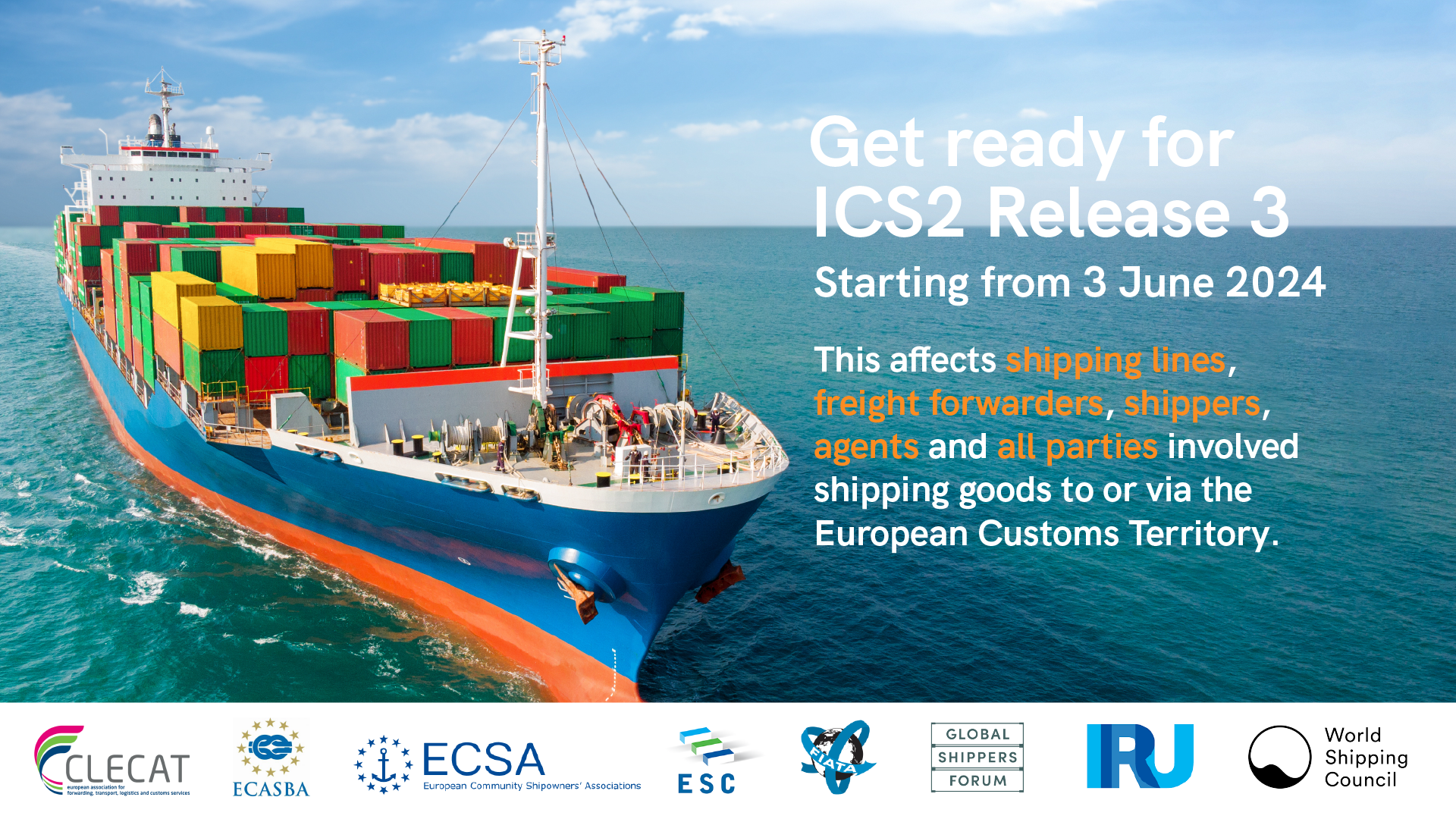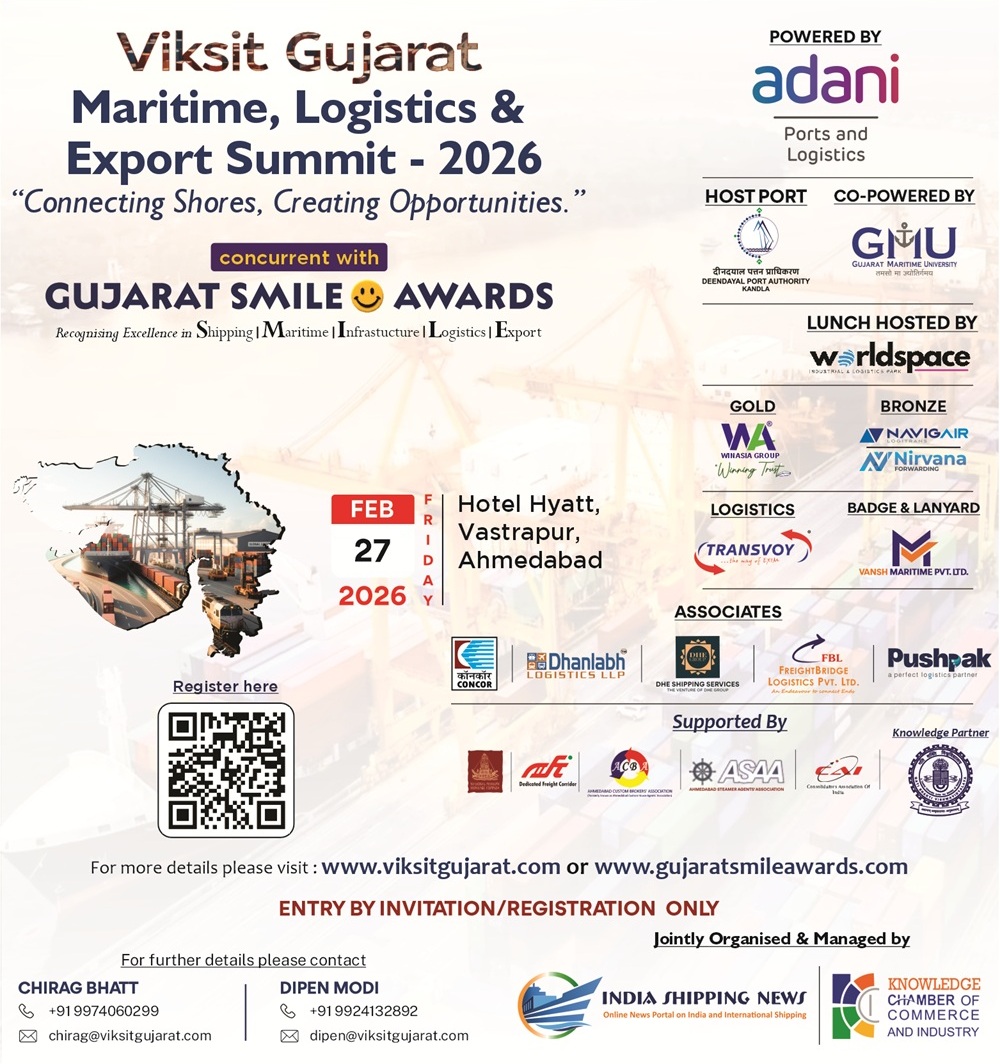
Logistics Trade Bodies unite in calls for Industry Action on New EU Import Declarations
LONDON : Global and European trade associations representing shippers, forwarders and vessel operators have issued an urgent alert to all businesses involved in the movement of goods into or via the European Union, Norway, Switzerland or Northern Ireland, by sea, road or rail to be ready for the new Import Control System (ICS2) that will start to be introduced from June this year.
The World Shipping Council, the International Federation of Freight Forwarders, the Global Shippers Forum, the European Community Association of Ship Brokers and Agents, the European Community Shipowners’ Associations, the European Associations for Forwarding, Transport, Logistics and Customs Services, the European Shippers Council and the International Road Transport Union, have together stressed the importance of the new controls and their impact on the movement of goods into or via the European Customs Territory by sea, road and rail.
Awareness of the implementation of the new requirements is key, says the group, as is understanding how ICS2 will affect different entities in the supply chain at different times and in distinct ways.
ICS2 is an enhanced safety and security regime introduced jointly by Customs authorities in the EU that requires specific details of imported goods to be provided before loading or before arrival at the EU border. The requirements were introduced for air cargo during 2023 and will be extended to sea transport from June 2024 and for imports arriving by road or rail in 2025. The extensive new data requirements include 6-digit HS codes for each item in a consignment, an ‘acceptable description’ and detailed buyer and seller information.
The trade bodies each representing different parties in the supply chain have urged businesses involved in moving goods into the EU to begin their preparations for the extension of ICS2 now and to seek further information on how they will be affected. The European Commission’s website is the best place to start.
Failure to comply with ICS2 requirements will result in delays and disruptions to exports to the EU from the rest of the world and to goods imported into the EU, and potentially, in accordance with Member State practice, fines and penalties for persons liable for submitting the Safety and Security data to ICS2.
Cooperative working between the different parties involved in such shipments is crucial to keep goods moving, as symbolised by the joint call to action by the eight trade bodies.
– About CLECAT
CLECAT represents the interests of 22 national organisations of European freight forwarders and customs agents. Multinational, medium and small freight forwarders and Customs agents are all part of CLECAT’s structures, thus making it the most representative structure of its kind in Europe.
Contact CLECAT
Nicolette van der Jagt: [email protected]
– About ECSABA
ECASBA is the recognised consultative body for ship agents and ship brokers in EU Member States protects and promotes those professions through contact with the European Commission and other European Union institutions, both directly and in collaboration with other European maritime sector organisations. ECASBA addresses any issues of European maritime policy that may affect its members. ECASBA is a member of the Trade Contact Group on customs issues, the expert subgroup of the HighLevel Steering Group on the European Maritime Single Window environment and the Carrier Working Group on electronic traveller registration and authorisation hosted by EU-LISA.
Contact ECASBA
Frank Janssens: [email protected]
– About the European Community Shipowners’ Associations
The European Community Shipowners’ Associations (ECSA) is the voice of the European shipping industry. Founded in 1965, ECSA promotes the interests of 21 member associations of the EU and Norway, representing 39.5% of the global fleet. ECSA strives for a regulatory environment that fosters the international competitiveness of European shipping.
Contact ECSA
Luisa Puccio: [email protected]
– About the European Shippers Council
The European Shippers’ Council is a non-profit European organisation representing cargo owners i.e. freight transport interests of around 100.000 companies throughout Europe, whether manufacturers, retailers, wholesalers (import and export, intercontinental). Collectively they are referred to as ‘shippers’ as neutral user of transport (all modes: air; road, rail, waterborne). ESC was established in 1963.
Contact ESC
Katsiaryna Kliuyeva: [email protected]
– About FIATA
FIATA International Federation of Freight Forwarders Associations is a non-governmental, membership-based organisation representing freight forwarders in some 150 countries. FIATA’s membership is composed of 114 Associations Members and more than 6,000 Individual Members, overall representing an industry of 40,000 freight forwarding and logistics firms worldwide. Based in Geneva, FIATA is ‘the global voice of freight logistics’ www.fiata.org.
Contact FIATA
Andrea Tang: [email protected]
– About Global Shippers Forum
GSF is the global business organisation speaking up for exporters and importers as cargo owners in international trade and transport. Its members are national and regional shippers’ associations representing thousands of manufacturing, wholesaling, and retailing businesses across five continents. GSF works for safe, competitively efficient, and environmentally sustainable global trade and logistics.
Contact GSF:
Maria Udy, Portcare: [email protected]
– About the International Road Transport Union
IRU, the world road transport organisation, promotes economic growth, prosperity and safety through the sustainable mobility of people and goods. Founded in 1948, IRU has members and activities in more than 100 countries.
Contact IRU
Marc Billiet: [email protected]
– About World Shipping Council
The World Shipping Council is the united voice of liner shipping, working with policymakers and stakeholder groups to shape the future growth of a socially responsible, environmentally sustainable, safe, and secure shipping industry. We are a non- profit trade association with offices in Brussels, London, Singapore and Washington, D.C. Read more at www.worldshipping.org

